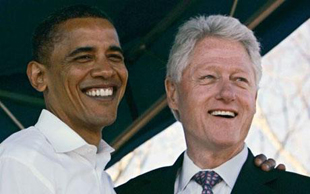
Last Friday, President Obama addressed the two topics that have been on many equity investors’ minds since election night: the economy and the dreaded “fiscal cliff.” In his speech, he delivered his familiar plan to combine spending cuts with increasing revenue by raising taxes on the wealthiest Americans. That’s “how we did it in the 1990s, when Bill Clinton was president,” says the president.
Clinton’s legacy was forged under a very different global scenario. He took the reigns just after the end of the Cold War in 1991. As the Soviet Union collapsed, we saw the very beginnings of globalization, with the world opening up to capitalist markets. There were lower labor costs around the world, so companies outsourced, encouraging global growth.
With lower military costs, the U.S. was benefitting from a “peace dividend,” allowing President Clinton to reallocate the spending from military purposes to domestic reforms. He deregulated the telecommunications industry, which helped unleash the Internet.
The confluence of global events combined with policymaking that encouraged business expansion and job creation helped Bill Clinton to be able to boast “the lowest unemployment rate in modern times, the lowest inflation in 30 years, the highest home ownership in the country’s history, dropping crime rates in many places, and reduced welfare rolls,” according to the White House’s biography of the former leader.
Clinton also declared that “‘the era of big government is over.’ He sought legislation to upgrade education, to protect jobs of parents who must care for sick children, to restrict handgun sales, and to strengthen environmental rules,” says the White House.
Over the past four years, we have not seen the same sort of government policies from Washington. The concern from business owners lately has been an issue that I’ve expressed over several months. When questioning whether an Obama win was a negative for equities, Credit Suisse pointed out that there was apprehension around a less business-friendly environment of “big government financed by taxation, more regulation etc.,” such as the additional cost incurred because of Obamacare.
To increase government revenue, it’s proposed that the top tax rates on dividends would increase from 15 percent to 39.6 percent for those earning more than $200,000 a year. He also wants to increase the tax rate on capital gains from 15 percent to 20 percent.
If this happens, Credit Suisse estimates that these tax increases would take about 5 percent off of the fair value of the S&P 500 Index, as “a third of the U.S. equity market is owned by individual investors who earn more than $200K a year.” Rather than reinvesting dividends and capital gains back into the stock market, these investors will be instead handing the money to the government.
Credit Suisse believes that even if a Mitt Romney administration would have been more business-friendly, there are two aspects to a reelection of Obama that equity investors might want to consider: 1) an Obama win means the Federal Reserve will continue to pursue its current policy and 2) a “fiscal cliff” compromise should be easier with an Obama victory compared to “a narrow Republican victory.”
The upcoming debate over the “fiscal cliff” is a new chance for the newly reelected president to show leadership, reach across the partisan table and work out a bipartisan solution. I believe a resolution to this important issue will be positive for markets.
As Credit Suisse says, “It is worth remembering that Clinton was able to do a deal with the Republicans in his second term (with a Republican House and Senate) after the lack of compromise in his first term led to a government shut-down.”
John Derrick, Director of Research, contributed to this commentary.
The S&P 500 Stock Index is a widely recognized capitalization-weighted index of 500 common stock prices in U.S. companies.



